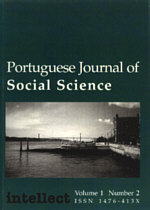ISSN
1476-413X

Migration in Europe: Challenges to Citizenship (pp. 82-88)
Maria I. Baganha
Family Relations in Lisbon’s Business Elite (pp. 89-110)
Antónia Pedroso de Lima
Cultural Differences and Hetero-ethnicization in Portugal: The Perceptions of White and Black People (pp. 111-128)
Jorge Vala
Diniz Lopes
Marcus Lima
Rodrigo Brito
Women under Salazar’s Dictatorship (pp. 129-146)
Anne Cova
António
Costa Pinto
Book reviews: João de Pina Cabral and António Pedroso de Lima (eds.), Elites:
choice, leadership and succession, Oxford: Berg (2000). Reviewed by
Richard Dunphy, University of Dundee. Anna Bosco, Comunisti: transformazioni di partito in Italia,
Spagna e Portogallo, Bologna: Il Mulino (2000), 334 pp. Reviewed by
James Newell, University of Salford.
Pinto, António Costa, The Blue Shirts: Portuguese
fascists and the New State, Boulder: Social Science Monographs
(2000), 271pp. Reviewed by Manuel Baiôa, University of Évora.
Migration
in Europe: Challenges to Citizenship
[Abstract]
The
world’s population is currently six billion people, 80 percent of whom
live in developing areas, and 50 percent live under the absolute poverty
line. Available forecasts
indicate that soon 90 percent of all population growth will take place in
these same developing areas where today 80 percent of the world population
is already concentrated. The political answer of Europe from the 1980s
onwards to the demographic unbalances of the world and to the movements of
escape from violence from developing regions has been an increasing
closure of its borders to the inflow of economic migrants and an extreme
reluctance to take in refugees and asylum seekers. In this work I will
discuss the European migratory experience and its current migratory
situation. I will attribute the current situation to a marked rupture
between immigrants’ and refugees’ individual rights and European
collective interests.
Family
Relations in Lisbon’s Business Elite
[Abstract]
High
status groups in Portuguese society constitute a social context in which
familial relations are of great importance, both at the level of family
members’ daily agency and on the far broader scale of their social and
professional relations. I will analyse in this article the way familial
relations become important processes by which an elite social position may
be maintained. My argument is based on fieldwork I carried out on seven
leading business families in Lisbon who own large firms in operation for
at least three generations. This research has showned that the processes
by which these families manage to remain majority shareholders and in the
top management position in the large companies they have owned for several
generations is due, to a great extent, to the fact that these economic
investments are considered the symbolic materialisation of a familial
project. It is by means of carefully managing familial relations that
those involved in these projects are able to ensure and reproduce their
belonging to Portugal’s financial and social upper set. This argument is
illustrated throughout my research into the processes by which the leading
families in Portugal’s economic setting before the democratic revolution
in 1974 have recovered their top financial and social positions in
Portugal today.
Cultural
differences and hetero-ethnicization in Portugal: the perceptions of White
and Black people
[Abstract]
An
analysis of some socio-psychological processes of discrimination against
black people is presented. This analysis is framed on the hypothesis
according to which cultural categories are now functional equivalents of
racial categories. Folk-cultural categories offer criteria that allow the
organization and the accentuation of differences between human groups, and
sustain the implicit process that transforms difference into inferiority (the
process of hetero-ethnicization). In favour of this hypothesis, the first
part of the paper analyses the main elements of social representations of
differences between human groups based on the idea of human races and then
the representations of differences based on cultural classifications.
Empirical arguments are then presented. The authors revisit data showing
that white Portuguese who accentuate the differences between themselves
and black people are more discrimination oriented then ‘non-differentialists’.
In the same vein, a study carried out on young black people living in
Portugal shows that those who most believe they are perceived to be
culturally different by the white Portuguese are also those who believe
most to be discriminated against.
Women
under Salazar’s Dictatorship
[Abstract]
If
the southern European dictatorships of the inter-war period have anything
in common, it is their attitudes towards women (Bock and Cova 2002).
Initiated during a period of democratization, of the emergence of feminist
movements, and the significant increase of women in the labour market, all
of these dictatorships paid homage to ‘women at home’, and glorified
‘motherhood’ and the family in its primordial function (Offen 1999;
Bock 2001). These dictatorships were at the same time confronted with the
‘problem’ of the integration of women into politics. Some elevated
this function to a nationalist goal and an important means of mobilizing
their regimes. This article addresses Salazarism’s attitudes towards
women and women’s organizations, providing some elements that may be
used in comparisons with the other dictatorships (e.g. Italian Fascism)
that inspired, to some extent, some of the Portuguese New State’s
institutions.